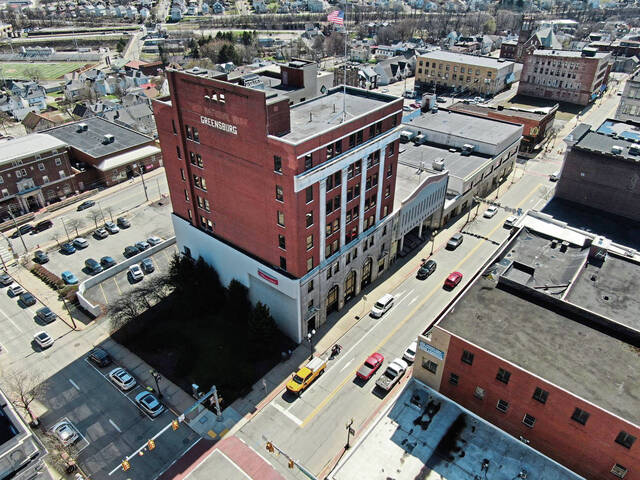https://development.triblive.com/local/westmoreland/renewed-vision-greensburgs-main-street-reimagined-as-dynamic-mix-of-new-housing-retail-restaurants/
Renewed vision: Greensburg's Main Street reimagined as 'dynamic mix' of new housing, retail, restaurants

An ambitious attempt to revitalize some century-old buildings on Greensburg’s Main Street will likely involve some future scholars to reach its maximum potential.
The Westmoreland County Housing Authority intends convert the century-old First Commonwealth Building and adjoining PNC Bank buildings into housing, retail, office and meeting spaces in what officials described as a renewed vision for the county seat.
“We’re asking for proposals from developers to redevelop the buildings potentially for condos, graduate student housing and retail as part of a multimillion- dollar project,” said housing authority Executive Director Mike Washowich. “What role we’ll play we don’t know yet. We have the assets, and we’re in talks with the city, county and state.”
“This redevelopment effort can become an area where there is a dynamic mix of food and beverage retail service, retail businesses, housing opportunities and destinations for the arts, culture and entertainment,” according to the documents detailing the authority’s recommendation for the development.
The housing authority, through a nonprofit subsidiary that owns a number of low-income and senior housing complexes throughout the county, purchased the Commonwealth Bank building from Seton Hill University in 2016 as part of an initial plan to convert the structure for subsidized housing.
Those plans have since been abandoned, and the authority has been in talks with officials from the city, county and university about how those buildings can factor into Greensburg redevelopment efforts. The new plan will not involve low-income or senior housing.
Commonwealth Bank still operates a branch on the building’s first floor along Main Street and rents space in the basement and subbasement levels. Its lease with the authority expires in 2029. The upper six floors are vacant. The three-story PNC Bank building next door has been vacant since 2020. The housing authority since the fall has held an option to purchase the building for $400,000.
The authority this month issued a request for proposals from developers, many of whom toured the buildings last week in preparation for the potential submissions of plans for the sites. Proposals are due to the authority by May 1.
Washowich said no decision has been made as to whether the authority will continue to own and lease the redevelopment buildings or sell them when the project is completed.
Housing potential
Redevelopment discussions have focused on potentially converting the buildings to accommodate housing for Seton Hill’s graduate students, including more than 200 enrollees at its affiliated Lake Erie College of Osteopathic Medicine.
Plans could include apartments, conference space and an adjoining restaurant on what is now green space at the coroner of Pittsburgh and Main Streets.
“Hopefully, we get some interesting proposals and we can move on these properties,” said Erik Spiegel, the authority’s chief operating officer and director of architectural and engineering services.
Seton Hill over the last decade and a half has grown its presence in downtown Greensburg with performing arts and arts centers and is currently working with a consultant to consider housing and other development options for the downtown area, according an email from spokeswoman Jennifer Reeger.
She said the school is in need of housing for about 200 graduate students annually. LECOM also is in need of off-campus housing for an additional 200 medical students each year, according to housing authority documents.
City officials said the authority’s plans are the linchpin for downtown redevelopment.
“This could be a domino effect for Main Street. We need to get something moving,” said Greensburg Councilman Greg Mertz.
City officials have long explored major redevelopment of the downtown area and many of the vacant buildings along Main Street have been targeted for rehabilitation or demolition. The blighted Advanced Furniture store was demolished last year by the county land bank and development options for the site are being sought.
The land bank also in the past year acquired the former Royer’s department store building across Main Street from the Commonwealth Bank building.
Meanwhile, the housing authority recently completed renovations at the former Troutman’s Building along Main Street that for two decades has been home to low-income senior apartments and office space for the county’s Area Agency on Aging.
Alec Italiano, Greensburg’s director of planning and development, said more development is needed in the city.
“We really want to make Greensburg a 24-hour, seven-day-a-week city and less of a nine-to-five one,” Italiano said.
Copyright ©2025— Trib Total Media, LLC (TribLIVE.com)
